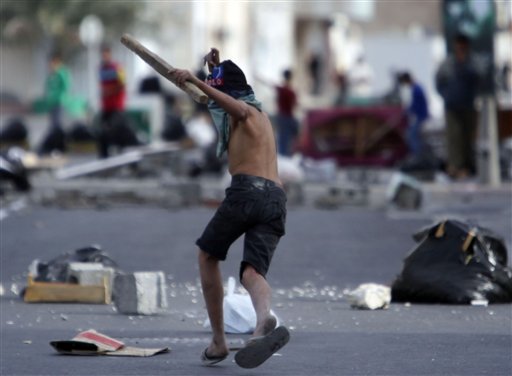WASHINGTON (AP) — President Barack Obama, struggling to find his footing in the upheaval shaking Bahrain, has urged the kings of that island nation and its ally, Saudi Arabia, to show restraint in dealing with protesters.
The calls to the monarchs Wednesday reflected the cautious approach Obama is taking in Bahrain after openly supporting anti-government protesters who forced out autocratic leaders in Tunisia and Egypt — both longtime U.S. allies.
Obama doesn’t want to sour the longstanding alliance that allows the U.S. Navy to maintain strategic port facilities in Bahrain for the powerful 5th Fleet, a bulwark of U.S. power in the Persian Gulf, the Indian Ocean and the Red Sea. Its presence is key to containing Iranian political and military ambitions in the region.
Bahrain has a Sunni monarchy, but it has a Shiite majority. A change in its leadership could be a boon for Iran’s Shiite theocracy.
Obama also doesn’t want to antagonize Saudi Arabia, another important ally and the world’s largest oil producer. Saudi Arabia heaped on complications early this week when it dispatched to Bahrain armored vehicles and a thousand soldiers, some of them from other Gulf countries.
On Wednesday, security forces used tear gas and armored vehicles to subdue the growing movement against the king. At least six people were killed as clashes flared across the kingdom, according to witnesses and officials.
White House spokesman Jay Carney said Obama, in his calls to King Abdullah of Saudi Arabia and King Hamad bin Isa Al Khalifa of Bahrain, expressed deep concern about the violence. He urged the leaders to open a political dialogue with protesters demanding an end to Bahrain’s 200-year-old monarchy.
Secretary of State Hillary Rodham Clinton added her voice to Obama’s on Wednesday, saying the situation had become “alarming.”
“We have deplored the use of force,” Clinton told reporters in Cairo.
Still, while denouncing violence, U.S. officials have not backed the protesters.
Aaron David Miller, a former Mideast adviser to six U.S. secretaries of state, said the United States was “caught in the middle. On one hand we are committed publicly to rather robust support of democratic forces, but trapped by our own devil’s bargain in maintaining interests that are vital to our policy.
“Bahrain,” he said, “is just the latest arena where American interests and values collide.”
The Obama administration has been far more circumspect with Bahrain and the Saudis than it was with Egypt’s former president, Hosni Mubarak. He was a major partner with Washington for three decades, but when protesters rose up to oust him last month, Obama’s administration openly called for Mubarak to leave power, as it did with Tunisia’s President Zine El Abidine Ben Ali.
“They don’t like what’s happening in Bahrain but they hesitate to be too tough on the Saudis because they know how terrified they are of Iran,” said Jonathan Adelman, a professor and Middle East expert at the University of Denver.
Obama stressed the importance of democracy in the Middle East when he gave a high-profile speech in Cairo shortly after taking office in 2009. While acknowledging that “America does not presume to know what is best for everyone,” he spoke of the need for greater freedom and governments that are transparent and honest.
“These are not just American ideas, they are human rights, and that is why we will support them everywhere,” he said.
The White House has pushed those ideas in Libya, where Moammar Gadhafi’s military now appears to be crushing a violent uprising against his long, erratic rule of the oil-rich North African nation. U.S. officials have called for Gadhafi’s departure, seized Libyan resources and imposed new sanctions. Still, Obama apparently has rejected military action like a no-fly zone.
Some analysts have urged Obama to continue being cautious.
“We don’t have to try to do decisive things in a matter of days or weeks,” Council on Foreign Relations President Richard Haas told MSNBC on Wednesday. He said the changes sweeping parts of the Middle East could take years or decades to play out.








